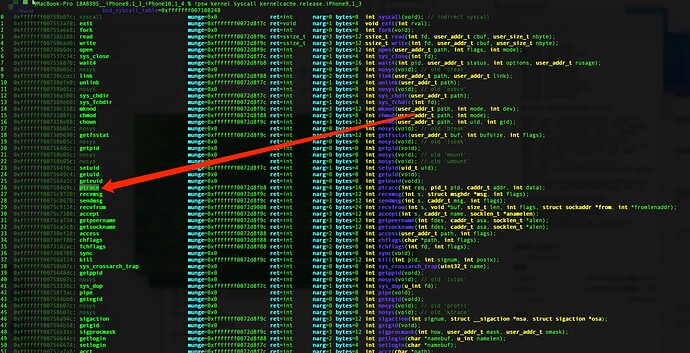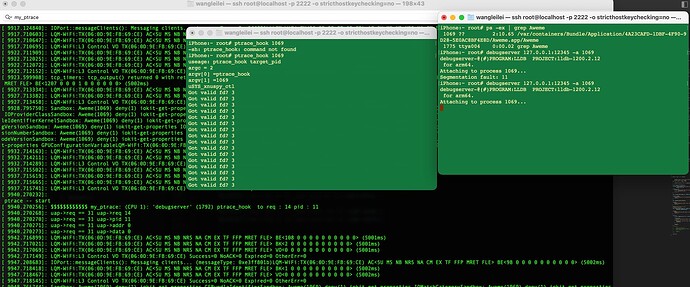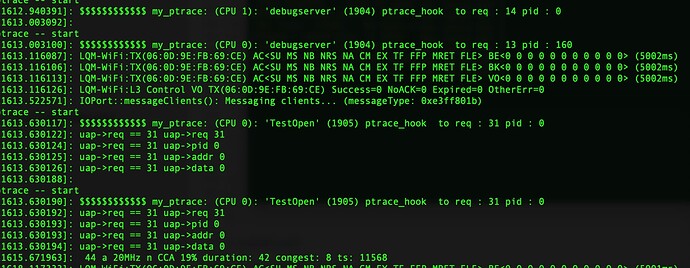昨天实践了修改kernproc 结构体绕过反调试.今天突然想到是不是直接内核hook 更方便点儿
0x01先阅读自己手机系统iPhone 7 的 14.1对应的xnu开源代码里面的ptrace代码
- xnu-xnu-7195.50.7.100.1/bsd/kern/mach_process.c
int
ptrace(struct proc *p, struct ptrace_args *uap, int32_t *retval)
{
struct proc *t; /* target process */
task_t task;
thread_t th_act;
struct uthread *ut;
int tr_sigexc = 0;
int error = 0;
int stopped = 0;
AUDIT_ARG(cmd, uap->req);
AUDIT_ARG(pid, uap->pid);
AUDIT_ARG(addr, uap->addr);
AUDIT_ARG(value32, uap->data);
if (uap->req == PT_DENY_ATTACH) {
#if (DEVELOPMENT || DEBUG) && !defined(XNU_TARGET_OS_OSX)
if (PE_i_can_has_debugger(NULL)) {
return 0;
}
#endif
proc_lock(p);
if (ISSET(p->p_lflag, P_LTRACED)) {
proc_unlock(p);
KERNEL_DEBUG_CONSTANT(BSDDBG_CODE(DBG_BSD_PROC, BSD_PROC_FRCEXIT) | DBG_FUNC_NONE,
p->p_pid, W_EXITCODE(ENOTSUP, 0), 4, 0, 0);
exit1(p, W_EXITCODE(ENOTSUP, 0), retval);
thread_exception_return();
/* NOTREACHED */
}
SET(p->p_lflag, P_LNOATTACH);
proc_unlock(p);
return 0;
}
if (uap->req == PT_FORCEQUOTA) {
if (kauth_cred_issuser(kauth_cred_get())) {
t = current_proc();
OSBitOrAtomic(P_FORCEQUOTA, &t->p_flag);
return 0;
} else {
return EPERM;
}
}
/*
* Intercept and deal with "please trace me" request.
*/
if (uap->req == PT_TRACE_ME) {
retry_trace_me: ;
proc_t pproc = proc_parent(p);
if (pproc == NULL) {
return EINVAL;
}
#if CONFIG_MACF
/*
* NB: Cannot call kauth_authorize_process(..., KAUTH_PROCESS_CANTRACE, ...)
* since that assumes the process being checked is the current process
* when, in this case, it is the current process's parent.
* Most of the other checks in cantrace() don't apply either.
*/
struct proc_ident p_ident = proc_ident(p);
struct proc_ident pproc_ident = proc_ident(pproc);
kauth_cred_t pproc_cred = kauth_cred_proc_ref(pproc);
proc_rele(pproc);
error = mac_proc_check_debug(&pproc_ident, pproc_cred, &p_ident);
kauth_cred_unref(&pproc_cred);
if (error != 0) {
return error;
}
if (proc_find_ident(&pproc_ident) == PROC_NULL) {
return ESRCH;
}
#endif
proc_lock(p);
/* Make sure the process wasn't re-parented. */
if (p->p_ppid != pproc->p_pid) {
proc_unlock(p);
proc_rele(pproc);
goto retry_trace_me;
}
SET(p->p_lflag, P_LTRACED);
/* Non-attached case, our tracer is our parent. */
p->p_oppid = p->p_ppid;
proc_unlock(p);
/* Child and parent will have to be able to run modified code. */
cs_allow_invalid(p);
cs_allow_invalid(pproc);
proc_rele(pproc);
return error;
}
if (uap->req == PT_SIGEXC) {
proc_lock(p);
if (ISSET(p->p_lflag, P_LTRACED)) {
SET(p->p_lflag, P_LSIGEXC);
proc_unlock(p);
return 0;
} else {
proc_unlock(p);
return EINVAL;
}
}
/*
* We do not want ptrace to do anything with kernel or launchd
*/
if (uap->pid < 2) {
return EPERM;
}
/*
* Locate victim, and make sure it is traceable.
*/
if ((t = proc_find(uap->pid)) == NULL) {
return ESRCH;
}
AUDIT_ARG(process, t);
task = t->task;
if (uap->req == PT_ATTACHEXC) {
#pragma clang diagnostic push
#pragma clang diagnostic ignored "-Wdeprecated-declarations"
uap->req = PT_ATTACH;
tr_sigexc = 1;
}
if (uap->req == PT_ATTACH) {
#pragma clang diagnostic pop
int err;
#if !defined(XNU_TARGET_OS_OSX)
if (tr_sigexc == 0) {
error = ENOTSUP;
goto out;
}
#endif
if (kauth_authorize_process(proc_ucred(p), KAUTH_PROCESS_CANTRACE,
t, (uintptr_t)&err, 0, 0) == 0) {
/* it's OK to attach */
proc_lock(t);
SET(t->p_lflag, P_LTRACED);
if (tr_sigexc) {
SET(t->p_lflag, P_LSIGEXC);
}
t->p_oppid = t->p_ppid;
/* Check whether child and parent are allowed to run modified
* code (they'll have to) */
proc_unlock(t);
cs_allow_invalid(t);
cs_allow_invalid(p);
if (t->p_pptr != p) {
proc_reparentlocked(t, p, 1, 0);
}
proc_lock(t);
if (get_task_userstop(task) > 0) {
stopped = 1;
}
t->p_xstat = 0;
proc_unlock(t);
psignal(t, SIGSTOP);
/*
* If the process was stopped, wake up and run through
* issignal() again to properly connect to the tracing
* process.
*/
if (stopped) {
task_resume(task);
}
error = 0;
goto out;
} else {
error = err;
if (error == ESRCH) {
/*
* The target 't' is not valid anymore as it
* could not be found after the MAC check.
*/
return error;
}
/* not allowed to attach, proper error code returned by kauth_authorize_process */
if (ISSET(t->p_lflag, P_LNOATTACH)) {
psignal(p, SIGSEGV);
}
goto out;
}
}
/*
* You can't do what you want to the process if:
* (1) It's not being traced at all,
*/
proc_lock(t);
if (!ISSET(t->p_lflag, P_LTRACED)) {
proc_unlock(t);
error = EPERM;
goto out;
}
/*
* (2) it's not being traced by _you_, or
*/
if (t->p_pptr != p) {
proc_unlock(t);
error = EBUSY;
goto out;
}
/*
* (3) it's not currently stopped.
*/
if (t->p_stat != SSTOP) {
proc_unlock(t);
error = EBUSY;
goto out;
}
/*
* Mach version of ptrace executes request directly here,
* thus simplifying the interaction of ptrace and signals.
*/
/* proc lock is held here */
switch (uap->req) {
case PT_DETACH:
if (t->p_oppid != t->p_ppid) {
struct proc *pp;
proc_unlock(t);
pp = proc_find(t->p_oppid);
if (pp != PROC_NULL) {
proc_reparentlocked(t, pp, 1, 0);
proc_rele(pp);
} else {
/* original parent exited while traced */
proc_list_lock();
t->p_listflag |= P_LIST_DEADPARENT;
proc_list_unlock();
proc_reparentlocked(t, initproc, 1, 0);
}
proc_lock(t);
}
t->p_oppid = 0;
CLR(t->p_lflag, P_LTRACED);
CLR(t->p_lflag, P_LSIGEXC);
proc_unlock(t);
goto resume;
case PT_KILL:
/*
* Tell child process to kill itself after it
* is resumed by adding NSIG to p_cursig. [see issig]
*/
proc_unlock(t);
#if CONFIG_MACF
error = mac_proc_check_signal(p, t, SIGKILL);
if (0 != error) {
goto resume;
}
#endif
psignal(t, SIGKILL);
goto resume;
case PT_STEP: /* single step the child */
case PT_CONTINUE: /* continue the child */
proc_unlock(t);
th_act = (thread_t)get_firstthread(task);
if (th_act == THREAD_NULL) {
error = EINVAL;
goto out;
}
/* force use of Mach SPIs (and task_for_pid security checks) to adjust PC */
if (uap->addr != (user_addr_t)1) {
error = ENOTSUP;
goto out;
}
if ((unsigned)uap->data >= NSIG) {
error = EINVAL;
goto out;
}
if (uap->data != 0) {
#if CONFIG_MACF
error = mac_proc_check_signal(p, t, uap->data);
if (0 != error) {
goto out;
}
#endif
psignal(t, uap->data);
}
if (uap->req == PT_STEP) {
/*
* set trace bit
* we use sending SIGSTOP as a comparable security check.
*/
#if CONFIG_MACF
error = mac_proc_check_signal(p, t, SIGSTOP);
if (0 != error) {
goto out;
}
#endif
if (thread_setsinglestep(th_act, 1) != KERN_SUCCESS) {
error = ENOTSUP;
goto out;
}
} else {
/*
* clear trace bit if on
* we use sending SIGCONT as a comparable security check.
*/
#if CONFIG_MACF
error = mac_proc_check_signal(p, t, SIGCONT);
if (0 != error) {
goto out;
}
#endif
if (thread_setsinglestep(th_act, 0) != KERN_SUCCESS) {
error = ENOTSUP;
goto out;
}
}
resume:
proc_lock(t);
t->p_xstat = uap->data;
t->p_stat = SRUN;
if (t->sigwait) {
wakeup((caddr_t)&(t->sigwait));
proc_unlock(t);
if ((t->p_lflag & P_LSIGEXC) == 0) {
task_resume(task);
}
} else {
proc_unlock(t);
}
break;
case PT_THUPDATE: {
proc_unlock(t);
if ((unsigned)uap->data >= NSIG) {
error = EINVAL;
goto out;
}
th_act = port_name_to_thread(CAST_MACH_PORT_TO_NAME(uap->addr),
PORT_TO_THREAD_NONE);
if (th_act == THREAD_NULL) {
error = ESRCH;
goto out;
}
ut = (uthread_t)get_bsdthread_info(th_act);
if (uap->data) {
ut->uu_siglist |= sigmask(uap->data);
}
proc_lock(t);
t->p_xstat = uap->data;
t->p_stat = SRUN;
proc_unlock(t);
thread_deallocate(th_act);
error = 0;
}
break;
default:
proc_unlock(t);
error = EINVAL;
goto out;
}
error = 0;
out:
proc_rele(t);
return error;
}
- 通过阅读源码发现只需要修改第二个参数的结构体属性uap->req 就可以达到绕过目的 (uap->req == PT_DENY_ATTACH)
定位内核ptrace函数偏移地址
分析第二个参数ptrace_args的内部结构
让我们详细分析 struct ptrace_args 在内存中的布局。在 64 位系统上,考虑到内存对齐和每个成员的大小,下面是详细的内存布局。
假设 pid_t 是 4 字节,user_addr_t 是 8 字节。在 64 位系统上,指针类型通常是 8 字节并且需要对齐到 8 字节边界。
首先,结构体定义如下:
struct ptrace_args {
int req; // 4 bytes
void * unknow[4]; //和实际内存的中偏移不符.实际pid 是+8,所以加了unknow填充
pid_t pid; // 4 bytes
user_addr_t addr;// 8 bytes (on a 64-bit system)
int data; // 4 bytes
};
内存布局和对齐分析:
-
int req:- 大小: 4 bytes
- 对齐: 4 bytes
- 偏移: 0
- 结束偏移: 4
-
pid_t pid:- 大小: 4 bytes
- 对齐: 4 bytes
- 偏移: 4(紧接在
req之后) - 结束偏移: 8
-
user_addr_t addr:- 大小: 8 bytes
- 对齐: 8 bytes
- 由于
addr需要 8 字节对齐,而当前偏移 8 已经对齐到 8 字节边界,因此无需填充 - 偏移: 8
- 结束偏移: 16
-
int data:- 大小: 4 bytes
- 对齐: 4 bytes
- 偏移: 16(紧接在
addr之后) - 结束偏移: 20
由于数据对齐要求,编译器可能会在结构体的末尾添加填充以确保结构体大小是对齐的。因此,整个结构体的大小是 24 字节(4 + 4 + 8 + 4 + 4(填充))。
详细内存布局:
+-------------+--------------+--------------+--------------+
| req (4 bytes) | unknow (4 bytes) |
+-------------+--------------+--------------+--------------+
| pid (4 bytes) | padding (4 bytes) |
+-------------+--------------+--------------+--------------+
| addr (8 bytes) |
+-------------+--------------+--------------+--------------+
| data (4 bytes) | padding (4 bytes) |
+-------------+--------------+--------------+--------------+
解释:
req占用偏移 0 到 3。unknow紧接其后,占用偏移 4 到 7。pid占用偏移 8 到 15。
这就是 struct ptrace_args 在内存中的布局。
编写代码
static int (*ptrace_orig)(struct proc *p, struct ptrace_args *uap, int32_t *retval);
static int my_ptrace(struct proc *p, struct ptrace_args *uap, int32_t *retval){
kprintf("\n ptrace -- start \n");
uint8_t cpu = curcpu();
pid_t caller = caller_pid();
char *caller_name = unified_kalloc(MAXCOMLEN + 1);
if(!caller_name){
kprintf("\n ptrace -- caller_name \n");
return ptrace_orig(p,uap,retval);
}
/* proc_name doesn't bzero for some version of iOS 13 */
_bzero(caller_name, MAXCOMLEN + 1);
proc_name(caller, caller_name, MAXCOMLEN + 1);
kprintf("$$$$$$$$$$$$ %s: (CPU %d): '%s' (%d) ptrace_hook to req : %d pid : %d \n", __func__, cpu,
caller_name, caller,uap->req,uap->pid);
unified_kfree(caller_name);
if (uap->req == 31 || uap->req == 14)
{
/* code */
kprintf("uap->req == 31 uap->req %d \n",uap->req);
kprintf("uap->req == 31 uap->pid %d \n",uap->pid);
kprintf("uap->req == 31 uap->addr %d \n",uap->addr);
kprintf("uap->req == 31 uap->data %d \n",uap->data);
return 0;
}
return ptrace_orig(p,uap,retval);
}
/* iPhone 7 14.1 */ //FFFFFFF007584D9C
ret = syscall(SYS_xnuspy_ctl, XNUSPY_INSTALL_HOOK, 0xFFFFFFF007584D9C,
my_ptrace, &ptrace_orig);
还是拿宇宙最强App 抖音测试下 . 成功!
测试下自己的app
void antiDebug() {
// ARM syscall to invoke ptrace with PT_DENY_ATTACH
#ifdef __arm64__
asm volatile(
"mov x0,#26\n"
"mov x1,#31\n"
"mov x2,#0\n"
"mov x3,#0\n"
"mov x16,#0\n"
"svc #128\n"
);
#endif
__asm__ volatile(
"mov x0, #31\n" // PT_DENY_ATTACH
"mov x1, #0\n"
"mov x2, #0\n"
"mov x3, #0\n"
"mov x8, #26\n" // syscall number for ptrace
"svc #0x80\n"
);
}
void antiDebug1() {
typedef int (*ptrace_ptr_t)(int _request, pid_t _pid, caddr_t _addr, int _data);
// ptrace(PT_DENY_ATTACH, 0, 0, 0);
void *handle = dlopen(0, RTLD_GLOBAL | RTLD_NOW);
ptrace_ptr_t ptrace_ptr = (ptrace_ptr_t)dlsym(handle, "ptrace");
ptrace_ptr(PT_DENY_ATTACH, 0, 0, 0);
}



